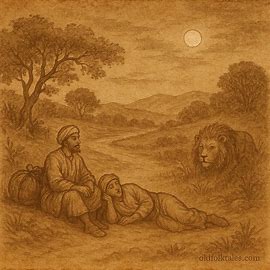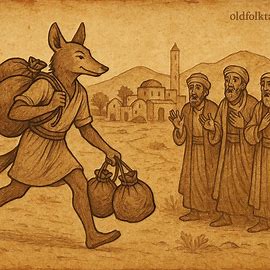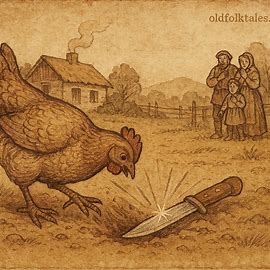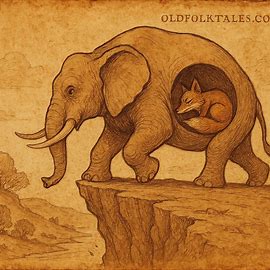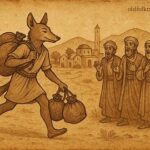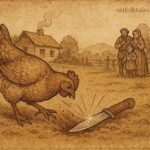Long ago, along the rugged road from Galab to Asmara, where travelers crossed the sun-baked plains of Tigrai, two men journeyed together. One was called “Light,” known for his pure heart, honesty, and simple ways. The other was called “Dark,” whose thoughts were cunning, self-serving, and heavy with pride. As dusk fell and shadows stretched across the rocky landscape, they sought a place to rest for the night.
The Dark One, thinking only of himself, devised a plan. “If I claim the best spot to sleep,” he mused, “while the Light One is left on the roadside, should a lion wander near, it will take him instead of me. Then I shall sleep in safety.” With his selfish strategy settled, he claimed the softest, most sheltered patch beneath a granitic boulder, while the Light One, trusting and unsuspecting, laid himself down on the edge of the path.
As the night deepened, the desert grew still and the moon climbed high. Unseen, a lion prowled through the darkness, drawn by the scent of vulnerability. Its powerful paws padded softly on the earth, silent as shadow itself. The beast approached the two men.
In the Dark One’s chosen sanctuary, his schemes failed him. The lion pounced upon the man of deceit, tearing through his defenses. He met a swift and violent end, devoured beneath the stars he had sought to manipulate for his own gain. Meanwhile, the Light One, sleeping innocently on the open roadside, remained untouched. When dawn broke over the plains, he awoke, unharmed, the golden sunlight bathing him in safety and hope.
This spot, ever since, has been remembered by travelers as “the resting place of the Light and the Dark.” Among the people, the story gave rise to the enduring proverb: “Be pure-hearted and sleep on the road!” Its lesson, simple yet profound, reminds all that integrity and sincerity are shields stronger than cunning and greed.
READ THIS: Beiho of the People of Old: A Tigrean Folktale That Teaches Lessons on Ingenuity and Cunning
In another telling, this place is called “the resting place of the wise and the foolish” (labeb-wa-gelul), with the proverb: “God protects the foolish” (?egel lagelul rabbi ^aqqebbfi). It is marked by a large granite boulder on the left of the road, just southward between Comarat and Qeruh, a silent witness to the fate of Light and Dark and a testament to divine justice and protection.
Moral Lesson
This Tigrean folktale teaches that purity of heart and integrity provide protection even in perilous circumstances. Those who seek to manipulate and exploit others, like the Dark One, may craft clever schemes, but their intentions often lead to their downfall. Conversely, those who live with honesty, simplicity, and trust, like the Light One, may find themselves safeguarded in ways that logic alone cannot explain.
The story reminds us that life rewards sincerity over cunning. It highlights that appearances and cleverness are no guarantee of safety, but virtue and pure-heartedness can provide unseen protection, often through forces greater than human control. In essence, God, or the natural order, guards those who walk the path of light, even when they seem vulnerable.
Knowledge Check
Who were the two men on the road?
The Light One, pure-hearted, and the Dark One, cunning and selfish.
What plan did the Dark One devise?
He chose the safe resting spot to avoid danger, leaving the Light One exposed.
Who attacked during the night?
A lion attacked, drawn to the vulnerability of the travelers.
What happened to the Dark One?
He was killed by the lion due to his selfishness and deceit.
What lesson did the Light One’s survival teach?
That purity, honesty, and simplicity can offer protection, even in danger.
Where does this folktale originate?
It is a Tigrean folktale from Eritrea.
Source: Tigrean folktale, Eritrea.
